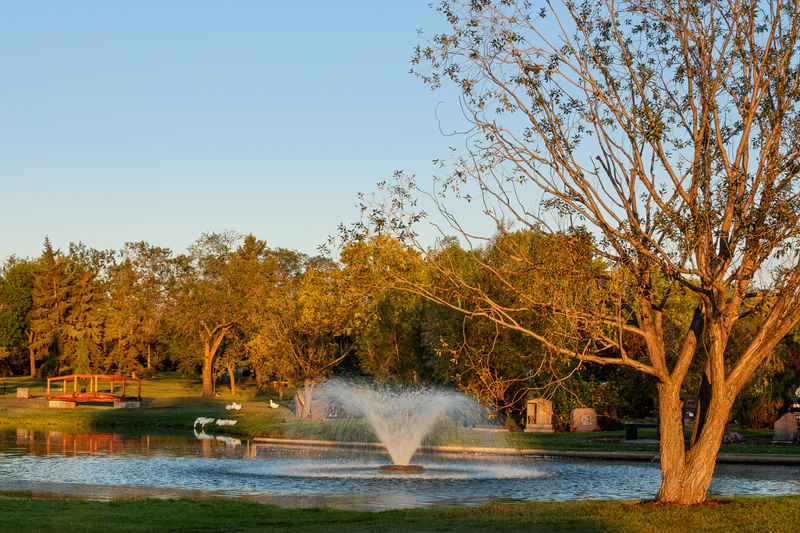
The Importance of Cemetery Pre-Arrangements
Introduction to Cemetery Pre-Arrangements
Cemetery pre-arrangements refer to the thoughtful process of planning and securing burial and memorial services ahead of time, either for oneself or for a loved one. At its core, this practice involves making decisions about one’s final resting place—a process that encompasses selecting a cemetery plot, purchasing burial or cremation services, and arranging for a headstone or marker. This proactive approach is becoming increasingly popular as more individuals recognize the benefits of planning ahead.
LOCATION DETAILS.

One of the fundamental reasons for the growing interest in cemetery pre-arrangements is the desire to alleviate emotional and financial burdens on surviving family members. When final arrangements are made in advance, surviving relatives are spared the stress and urgency of making these decisions during an already difficult time. Additionally, pre-arranging cemetery services locks in current prices, providing financial predictability and potentially shielding families from future cost increases.
The basic steps involved in cemetery pre-arrangements include:
1. **Selecting a Cemetery and Plot**: Researching and choosing a cemetery that aligns with one’s personal preferences and values. This might involve visiting multiple cemeteries, considering location, landscape, and offered services.
2. **Purchasing Burial or Cremation Services**: Deciding between burial and cremation, and purchasing the required services. This decision might also be influenced by religious or cultural considerations.
3. **Arranging for Memorialization**: Choosing and designing a headstone, marker, or other forms of memorialization. This step allows individuals to personalize their final resting place, ensuring it reflects their identity and legacy.
By addressing these essential steps, cemetery pre-arrangements ensure that one’s final wishes are respected and adhered to, ultimately providing peace of mind. As the importance of proactive planning in end-of-life decisions gains recognition, the trend of cemetery pre-arrangements is expected to continue growing in popularity.
Emotional Benefits of Pre-Arranging a Cemetery Plot
Pre-arranging a cemetery plot offers significant emotional benefits for both individuals and their families. One of the most profound advantages is the alleviation of emotional stress and burden for loved ones during a period of grief. When a person passes away, their family members often experience immense emotional turmoil. The thought of making important decisions about burial arrangements can add to this strain, making an already challenging time even more difficult. By pre-arranging a cemetery plot, much of this immediate burden is lifted, allowing family members to focus on mourning and supporting each other.
Another critical emotional benefit of cemetery pre-arrangements is the peace of mind it provides to the individuals making such plans. Knowing that their final wishes will be honored—as specified—offers a sense of control and reassurance. This is particularly important in ensuring that personal or religious preferences are respected, removing any uncertainty about their last rites and resting place. For many, this relief translates to a reduction in anxiety about the future, allowing them to live their remaining years without the lingering worry of posthumous responsibilities affecting their family.
Additionally, pre-arranging cemetery plots can significantly reduce the potential for family disputes. Grieving family members might have differing opinions on what they believe the deceased would have wanted, leading to conflict during an already sensitive time. By having a clear, pre-determined plan, these disagreements can be avoided, fostering a more harmonious environment during the grieving process.
In essence, the emotional benefits of pre-arranging a cemetery plot extend far beyond the individual. They impact the collective mental well-being of those left behind, ensuring that the final farewell is conducted with the dignity and respect that align with the deceased’s wishes. This thoughtful approach to end-of-life planning underscores the importance of considering cemetery pre-arrangements—not merely as a logistical step, but as a compassionate act towards oneself and one’s loved ones.
Financial Advantages of Pre-Planning
Pre-arranging a cemetery plot offers significant financial advantages that can provide peace of mind for individuals and their families. One of the primary benefits is the ability to lock in current prices, which can shield individuals from future price increases driven by inflation. As the cost of cemetery plots and associated services continues to rise over time, securing a plot at today’s prices can result in substantial savings. This foresight ensures that loved ones are not burdened with potentially higher costs in the future.
Another noteworthy benefit of pre-planning is the availability of flexible payment plans and financing options. Many cemeteries offer the opportunity to spread payments over an extended period, making the expense more manageable for individuals and families. These plans can be tailored to suit various financial situations, offering the convenience of paying in installments rather than a single, potentially burdensome, lump sum. This flexibility helps alleviate the financial strain that might otherwise be experienced during an emotionally challenging time.
Moreover, pre-arranging cemetery plots can also offer potential tax advantages. In certain jurisdictions, pre-need arrangements may qualify for tax benefits, reducing the overall financial burden. Consulting with a financial advisor or tax professional can help individuals understand the specific advantages applicable to their situation and maximize the benefits of their pre-planning efforts.
In addition to direct financial savings, pre-planning can minimize indirect costs by reducing the need for last-minute arrangements. During a time of grief, making quick decisions under emotional stress can lead to inadvertent overspending. Pre-planning provides the opportunity to make thoughtful, informed choices well in advance, ensuring that financial resources are allocated efficiently.
Overall, the financial advantages of pre-arranging a cemetery plot underscore the importance of proactive planning. By securing current prices, leveraging flexible payment plans, and potentially enjoying tax benefits, individuals can ensure their final arrangements do not impose an undue financial burden on their loved ones.
Personalization of Final Wishes
Pre-arrangements for a cemetery offer a significant advantage by allowing individuals to personalize their final resting place according to their preferences. Personalization can encompass a range of choices, from selecting a specific plot location to determining the details of one’s memorial.
Choosing a particular plot is one of the initial steps in pre-arranging one’s final resting place. This decision could be influenced by various factors such as proximity to loved ones, a serene environment, or a place that holds sentimental value. The option to select a desired plot location ensures that individuals can repose in a setting that aligns with their personal or familial connections.
Additionally, pre-arrangements provide the opportunity to personalize memorial details. Elements such as headstone design, inscriptions, and the inclusion of certain symbols or motifs can reflect an individual’s personality, values, and life journey. For instance, a headstone might feature specific religious symbols, preferred quotes, or even artistic designs that resonate deeply with the deceased’s identity. By making these decisions in advance, individuals can ensure that their legacy is memorialized in a manner that truly represents their essence.
Customization of final wishes extends beyond the physical aspects of the burial site. It can also include instructions for the type of funeral service or memorial ceremony desired. By pre-arranging these details, individuals offer clarity and guidance to their loved ones during a time of grief, alleviating the emotional burden of making these decisions under duress.
Ultimately, pre-arranging and personalizing final wishes is about ensuring that one’s legacy is carried out precisely as intended. It is an act of forethought and care that honors one’s life and beliefs, providing peace of mind knowing that their final resting place mirrors their uniqueness and preferences. Through thoughtful pre-arrangement, the final reflection of one’s journey is preserved with dignity and personal significance.
When it comes to cemetery pre-arrangements, understanding the legal considerations and ensuring proper documentation are of paramount importance. Engaging in cemetery pre-arrangements involves a series of contractual obligations that must comply with state and local regulations. These laws can vary significantly by jurisdiction, which makes it crucial to seek legal counsel or work with a qualified professional associated with funeral services.
One of the critical elements of pre-arrangements is the proper documentation of all plans and wishes. This involves creating legally binding contracts that specify all the details related to the burial plot, grave type, and any services associated with the cemetery. Well-documented plans must clearly outline specific requests to ensure that they are legally enforceable when the time comes.
Effective record-keeping is another crucial aspect of cemetery pre-arrangements. Keeping meticulous records helps avoid potential disputes among family members who may have different opinions about the deceased’s wishes. Legal documents such as the last will and testament, along with the contract for cemetery services, should be stored in a secure but accessible place. Informing trusted family members or the executor of your estate about these documents and their location is advisable.
By having clear and legally binding plans, individuals can ensure that their final wishes will be honored without complications or delays. Additionally, well-structured legal documentation helps to prevent any ambiguity, providing peace of mind to both the individual and their loved ones. This preparation is particularly significant in scenarios involving blended families or contentious familial relationships, where disagreements are more likely to arise.
In essence, taking the time to understand the legal considerations involved in cemetery pre-arrangements and documenting them properly is an invaluable step. Doing so not only respects the legal requirements but also upholds the individual’s final wishes, safeguarding against future familial conflicts and ensuring a smooth execution of all arrangements.
Comparing Different Types of Cemetery Pre-Arrangement Options
The decision to pre-arrange cemetery arrangements can significantly ease the emotional and financial burden for one’s loved ones during a difficult time. There are several types of cemetery pre-arrangement options available, each presenting unique advantages and considerations that cater to diverse preferences and necessities.
Traditional Burial Plots: Opting for a traditional burial plot is a common choice, especially for those who value a traditional form of memorialization. This option typically involves purchasing a plot of land in a cemetery and a headstone or marker for the gravesite. One of the primary advantages of a traditional burial plot is the permanence it offers. Families can find comfort in having a physical location to visit and pay their respects. However, it is essential to consider the ongoing maintenance costs and the potential need for perpetual care services, which can add to the overall expense over time.
Mausoleums: For individuals or families seeking an above-ground interment, mausoleums provide a distinguished alternative. Mausoleums are structures designed to house caskets in individual crypts, offering protection from the elements. This option can be more expensive than traditional burial plots due to the construction and maintenance of the structure. Nevertheless, mausoleums are often perceived as prestigious, and they can serve as an enduring monument for future generations. Additionally, mausoleums may provide a multi-sectional space, allowing family members to be interred together, which can be meaningful for some families.
Cremation Niches: Cremation niches are designated spaces, often within columbariums, where cremated remains are placed. This option is growing in popularity due to its cost-effectiveness and environmental considerations. Cremation niches can be accompanied by a plaque or other marker, providing a modest yet dignified memorial. One of the main advantages of cremation niches is their typically lower cost compared to both traditional burial plots and mausoleums. Furthermore, they require less land space, addressing concerns about cemetery space availability. However, personal preference plays a pivotal role in the decision, as some individuals may prefer the tangibility of a traditional burial site.
In assessing these options, it is fundamental to consider factors such as cost, permanence, and personal values. Regardless of the choice, cemetery pre-arrangements ensure that one’s final wishes are respected and can provide peace of mind for both the individual and their loved ones.
How to Start the Pre-Arrangement Process
Starting the cemetery pre-arrangement process can seem daunting, but with a structured approach, it becomes a manageable and thoughtful endeavor. The first step involves gathering necessary information and documents. Essential documents to have on hand include your birth certificate, Social Security card, and any relevant military service records or documentation. Additionally, it is helpful to prepare a list of personal preferences regarding burial or cremation, type of memorial service, and desired cemetery location.
Next, research is crucial. Begin by identifying cemeteries in the preferred geographic area. Utilize online databases, read reviews, and seek recommendations to compile a list of potential choices. Scheduling visits to these cemeteries allows for a first-hand assessment of the grounds, facilities, and overall ambiance. During these visits, it is important to ask pertinent questions. Inquire about the cemetery’s policies on maintenance, perpetual care, and any additional fees that might arise. Understanding these aspects can prevent future misunderstandings and ensure that your chosen cemetery aligns with your values and expectations.
Engaging with cemetery representatives is a pivotal part of the pre-arrangement process. Prepare a list of questions ahead of time to cover important topics such as plot availability, the process for transferring ownership, and the specifics of pre-payment plans. These discussions provide clarity and can reveal important details that may not be immediately apparent from brochures or websites alone.
Involving family members in the pre-arrangement discussions is highly beneficial. Open dialogue can alleviate concerns and ensure that everyone’s wishes are respected. Family members can provide support, offer valuable insights, and help make critical decisions. Group meetings with family and cemetery representatives can facilitate a comprehensive understanding and agreement on the arrangements.
Lastly, thoroughly review all contracts and documentation before finalizing any agreements. Ensure that all terms are clearly understood and that all personal preferences are accurately documented. Taking these careful steps in the pre-arrangement process not only secures peace of mind for you but also provides an invaluable gift of clarity and reduced burden for your loved ones.
Real-Life Stories and Testimonials
Consider the testimonial of Emily, a retired schoolteacher. Emily opted for cemetery pre-arrangements after seeing her family grapple with arranging her father’s funeral. By making all the decisions in advance, Emily ensured that when she passed away, her family could focus on grieving rather than logistical details. Emily’s children expressed immense relief, recognizing that her thoughtful planning spared them from making difficult choices during an already challenging time.
Another poignant example is the story of John and Linda, a couple married for over 50 years. Realizing the importance of pre-arrangement, they collectively selected a burial plot and planned their memorial services down to the last detail. When John passed away, Linda found solace in knowing that she was honoring his wishes precisely. Friends and family members spoke at the service, commenting on how the ceremony felt genuinely reflective of John’s personality and values, something made possible through pre-arrangement.
Mark’s story further illustrates the significance of cemetery pre-arrangements. Diagnosed with a terminal illness, Mark decided to plan his funeral to alleviate stress on his partner. He used the pre-arrangement process to personalize every aspect, from the type of service to the songs to be played. His partner later shared that Mark’s foresight gave him the gift of time, allowing him to focus on creating final memories rather than navigating funeral logistics.
These real-life stories highlight the critical benefits of making cemetery pre-arrangements. They underscore the peace of mind and emotional relief experienced by the families left behind. Each testimonial reflects how proactive planning in one’s final affairs can transform difficult moments into ones filled with peace, respect, and lasting memories, highlighting the profound impact such thoughtful preparations can have on loved ones.
